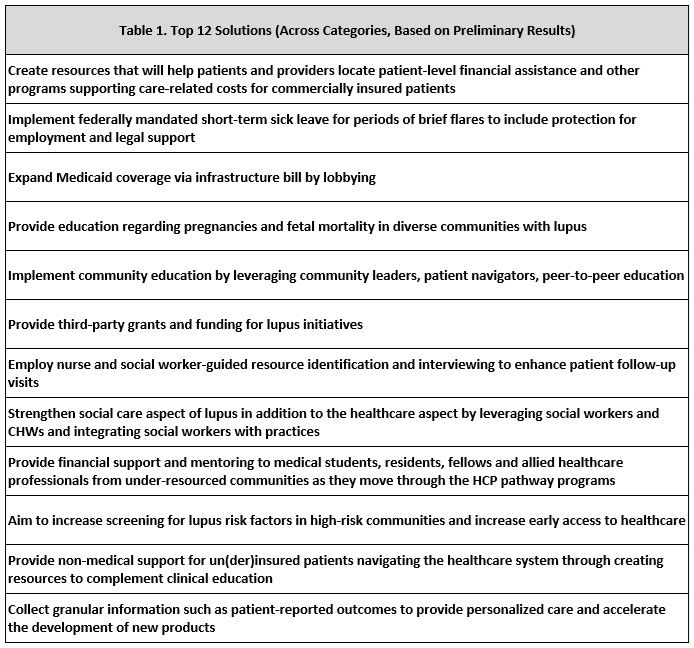Session Information
Session Type: Poster Session A
Session Time: 10:30AM-12:30PM
Background/Purpose: Health disparities among racial and ethnic minoritized individuals living with lupus remain a critical public health concern. Challenges related to healthcare affordability, accessibility, and quality severely impact health outcomes for these historically marginalized communities. Addressing negative social determinants of health linked to disparate outcomes requires addressing complex challenges including gaps in patient and provider education, absence of financial safety nets, limitations in shared decision-making and lack of access to multidisciplinary care teams. In response, The Lupus Foundation of America, together with an advisory panel of lupus experts, conducted formative research aimed at addressing these complex challenges and ultimately bridging the gap in equity and improving the quality of life for all people living with lupus.
Methods: Curating solutions to address social determinants of health was a stepwise process. Initially, we conducted a literature review of primary sources using PubMed with MeSH/non-MeSH terms according to the Preferred Reporting Items for Systematic Reviews and Meta-Analyses Extension for Scoping Reviews (PRISMA-ScR) guidelines. A secondary search of keywords provided a baseline understanding of potential solutions and initiatives underway. An advisory panel of lupus experts iteratively reviewed the list of literature-scoped solutions in working sessions, filling knowledge gaps and classifying solutions based on area of focus, feasibility, and impact. Seven in-depth semi-structured interviews with pharmaceutical industry experts; diversity, equity, and inclusion specialists; and select members of the advisory panel were leveraged to further refine the list of solutions. Finally, a modified Delphi survey approach was leveraged to align the advisory panel based on feasibility, impact, and implementation costs.
Results: Thirty-three solutions were identified and classified into four key categories: Financial Safety Net, Patient Education and Shared Decision-Making, Physician Education, and Other Solutions. Some solutions, such as “Creating resources to help patients and providers locate patient-level financial assistance” and “Programs supporting care-related costs for commercially insured patients,” have several initiatives underway. Other solutions, such as “Guidance on how education can be implemented for various demographics,” do not appear to have ongoing efforts. Overall high-priority solutions identified included “Collecting granular information like patient-reported outcomes to provide personalized care and accelerate development of new products,” “Expanding Medicaid coverage via infrastructure,” and “Supporting people living with lupus in applying and getting approval for disability.”
Conclusion: Addressing health and healthcare disparities linked to negative social determinants of health is a key goal in management of lupus, where disparities in outcomes can be stark. Increasing the visibility of potential solutions and aligning the community on top priorities can enable more efficient and effective contributions to healthcare equity and ultimately better health outcomes for lupus patients.
To cite this abstract in AMA style:
Buie J, Fisher M, Tlydsley H, Backor K, Costenbader K. Identifying Solutions to Address Racial and Ethnic Health Disparities in Lupus: A Consensus-Based Approach [abstract]. Arthritis Rheumatol. 2024; 76 (suppl 9). https://acrabstracts.org/abstract/identifying-solutions-to-address-racial-and-ethnic-health-disparities-in-lupus-a-consensus-based-approach/. Accessed .« Back to ACR Convergence 2024
ACR Meeting Abstracts - https://acrabstracts.org/abstract/identifying-solutions-to-address-racial-and-ethnic-health-disparities-in-lupus-a-consensus-based-approach/

